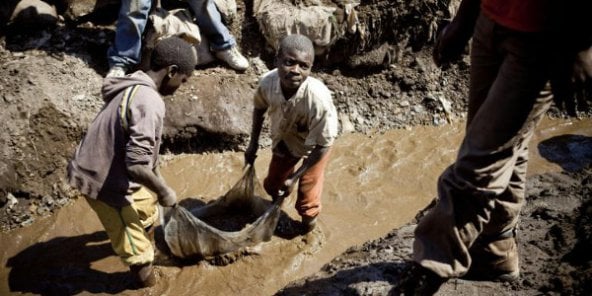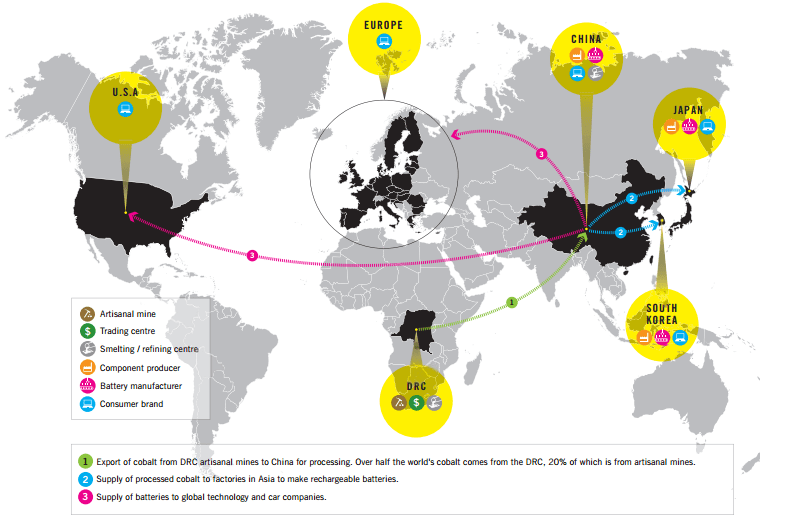 New evidence of cobalt mining in the former Katanga Province in the Southern Region of the Democratic Republic of Congo (DRC) has just been published.
New evidence of cobalt mining in the former Katanga Province in the Southern Region of the Democratic Republic of Congo (DRC) has just been published.
Titled “This is What We Die For” the report jointly published by Amnesty International and the African Resource Watch (Afrewatch) contains troubling human rights abuses in artisanal and industrial cobalt mining.
“Several children said that they had been beaten, employed by mining companies when they trespassed on those companies’ mining concessions. Security guards also demanded money from them. Most children indicated that they earned between 1,000-2,000 Congolese Francs per day (US$1-2). Children who collected, sorted, washed, crushed and transported minerals were paid per sack of minerals by the traders. The children had no way of independently verifying the weight of the sacks or the grade of the ore, and so had to accept what the traders paid them, making them susceptible to exploitation” the report states.
The UN agency responsible for Children related issues, UNICEF estimates that that approximately 40,000 boys and girls work in all the mines across southern DRC, many of them involved in cobalt mining.
DRC’s government has in place regulations governing the sector. Yes, this has not prevented the abuse of local populations.
“There is a significant lack of capacity within governmental agencies to monitor and enforce safeguards and improve conditions for artisanal miners. The Ministry of Labour is responsible for ensuring effective implementation of the DRC Labour Code, including inspecting worksites for child labour and ensuring that they abide by health and safety rules. However in 2014, the Ministry only employed 20 inspectors for the entire mining region of southern DRC. The government has been criticised by UN human rights monitoring bodies, ILO expert bodies, NGOs and others for its failure to put in place an adequate labour inspection system, to remove children from the worst forms of child labour, and to prioritize primary school enrolment.”
Cobalt Supply Chain
“Researchers followed vehicles of miners and traders as they carried cobalt ore from artisanal mines in Kolwezi to a market at Musompo, where minerals are traded. Independent traders at Musompo – most of them Chinese – buy the ore, regardless of where it has come from or how it has been mined. In turn, these traders sell the ore on to larger companies in the DRC which process and export it. One of the largest companies at the centre of this trade is Congo Dongfang Mining International (CDM).”
 CDM is a 100% owned subsidiary of China-based Zhejiang Huayou Cobalt Company Ltd (Huayou Cobalt), one of the world’s largest manufacturers of cobalt products. Operating in the DRC since 2006, CDM buys cobalt from traders, who buy directly from the miners.
CDM is a 100% owned subsidiary of China-based Zhejiang Huayou Cobalt Company Ltd (Huayou Cobalt), one of the world’s largest manufacturers of cobalt products. Operating in the DRC since 2006, CDM buys cobalt from traders, who buy directly from the miners.
“CDM then smelts the ore at its plant in the DRC before exporting it to China. There, Huayou Cobalt further smelts and sells the processed cobalt to battery component manufacturers in China and South Korea. In turn, these companies sell to battery manufacturers, which then sell on to well-known consumer brands,” the report states.
“In seeking to understand how this international supply chain works, as well as to ask questions about each company’s due diligence policy, Amnesty International wrote to Huayou Cobalt and 24 other companies in China, Germany, Japan, South Korea, Taiwan, UK, and the USA. These companies include some of the world’s largest and best known consumer electronics companies, including Apple Inc., Dell, HP Inc. (formerly Hewlett-Packard Company), Huawei, Lenovo (Motorola), LG, Microsoft Corporation, Samsung, Sony and Vodafone, as well as vehicle manufacturers like Daimler AG, Volkswagen and Chinese firm BYD.”
More than half of the world’s total supply of cobalt comes from the Democratic Republic of the Congo (DRC). According to the government’s own estimates, 20% of the cobalt currently exported from the DRC comes from artisanal miners in the southern part of the country. There are approximately 110,000 to 150,000 artisanal miners in this region, who work alongside much larger industrial operations.
The growing global market for portable electronic devices and rechargeable batteries is driving the growing demand for the extraction of cobalt, a key component in lithium-ion rechargeable batteries.
